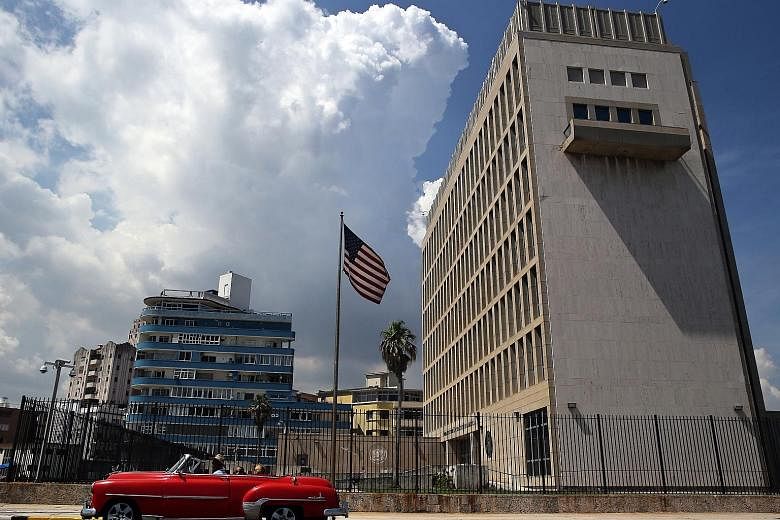WASHINGTON • United States and Canadian officials are conducting investigations after diplomats posted to Havana fell ill, amid reports that they may have been targeted by a mysterious sonic weapon.
US officials refused to directly blame Cuba itself for the "incidents", which appear to have begun last year, and Havana insisted it is working to protect the US mission.
A State Department spokesman would not detail the nature or number of the injuries, but she confirmed on Thursday that a number of US diplomats had returned home for treatment.
Unidentified officials told CNN and other US media that the staff may have been harmed by a sonic device fired either inside or outside their Havana residences.
Some countries have developed sonic and ultrasonic weapons that can be used for crowd control or, for example, to deter seaborne pirates without resorting to lethal force.
But there are no known cases of such a device being deployed by hostile intelligence services or terrorists against a diplomatic mission.
State Department spokesman Heather Nauert said investigations are ongoing and that Washington is not directly accusing Cuba of being behind the "incidents".
But - justifying the expulsion of two Cuban diplomats from Washington - she insisted that Cuba, as the US mission's host nation, bears responsibility for its security.
Of the reported victims, she said: "What I can tell you is that these were US government personnel who were in Cuba, in Havana, on official duty on behalf of the US government.
"We consider these to be 'incidents' because we still are trying to determine the actual cause of their situation. They have had a variety of physical symptoms," she said.
Ms Nauert said US personnel began experiencing ailments late last year, but that it was not immediately recognised that it could be anything other than an ordinary health issue.
Cuba's Foreign Ministry said US officials had alerted it to "some alleged incidents affecting some officials of that diplomatic mission and their families" on Feb 17.
Later, after some US staff left, US officials asked two Cuban diplomats to leave Washington in response.
Meanwhile, Canada confirmed that one of its envoys suffered a similar incident.
"We are aware of unusual symptoms affecting Canadian and US diplomatic personnel and their families in Havana," Canadian Foreign Ministry spokesman Brianne Maxwell said.
Cuba said it had objected to the expulsion of its officials, while also urging the US to work together to shed light on the incidents in Havana.
"Cuba took this issue with the utmost seriousness and acted expeditiously and professionally to clarify the facts of this situation," the Foreign Ministry said.
The communist state stressed the need for the US authorities to share information on the probe and promised to reinforce security around the mission.
Relations between the US and Cuba were restored by then US President Barack Obama and his Cuban counterpart Raul Castro in 2015 after a half-century break.
But tensions mounted again after the detente was partly rolled back by Mr Obama's successor Donald Trump, who won the votes of many Cuban Americans by promising a tough line.
In June, Mr Trump announced tightened rules for Americans travelling to Cuba, banned ties with a military-run tourism firm and reaffirmed the existing US trade embargo.
AGENCE FRANCE-PRESSE

